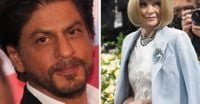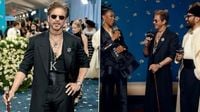Shah Rukh Khan, India’s most beloved cinematic icon, made his much-anticipated debut at the 2025 Met Gala on May 5, donning an elegant Sabyasachi ensemble. However, what should have been a triumphant moment quickly turned into a source of disappointment and outrage as the global superstar was met with a shocking lack of recognition from the foreign media. During an interview, a journalist asked him, "Who are you?" and he received a mere three seconds of coverage from Vogue.
Shah Rukh Khan, often referred to as SRK, has ruled Indian cinema for over 30 years and commands a global fanbase of billions. His presence at the Met Gala was expected to be a historic moment, not just for him, but for the representation of South Asian artists on a global platform. Instead, the event highlighted ongoing issues of cultural bias and underrepresentation in international media.
As Khan walked the blue carpet, he was dressed in a striking black suit, layered necklaces, and a tiger-headed cane, all part of his custom Sabyasachi look. Yet, the media's failure to recognize him, coupled with the awkwardness of the interview conducted by co-hosts Teyana Taylor and Ego Nwodim, left many fans feeling humiliated. Khan responded to the media's confusion with his signature calm, stating, "I am Shah Rukh," as the paparazzi looked on in silence.
Kiara Advani, another Bollywood star who made her Met Gala debut, faced a similar fate, not appearing in any official media footage. Fans on social media expressed their frustration, with one user asking, "Why are we still treated like this in 2025?" Another called the experience "humiliating." Platforms like X (formerly Twitter) and Reddit have since become battlegrounds for disappointed fans demanding accountability and respect for global stars.
The contrast in treatment between non-Western celebrities and their Western counterparts was glaring. Had a Western celebrity like Timothée Chalamet or Harry Styles attended, even the slightest gesture would have been celebrated with slow-motion montages and in-depth commentary. Yet, for icons like Shah Rukh Khan, the attention often falls short or is entirely absent.
The Met Gala’s 2025 theme, “The Art of Black Style,” was meant to celebrate diverse cultural expressions. However, the sidelining of figures like Khan, who represent global diversity, raises broader questions about racial and cultural bias in international media and fashion circles. The incident has sparked discussions about systemic exclusion that persists in global events.
Fans and cultural commentators agree that the treatment of Khan was not merely an oversight but a reflection of entrenched biases. One fan articulated the sentiment: "They didn’t know who the King was. That’s not on us—that’s on them." This statement encapsulates the frustration felt by many in the South Asian community, who believe their cultural icons deserve better recognition.
Shah Rukh Khan's presence at the Met Gala was not just significant in terms of representation; it also marked a milestone for Bollywood on a global stage. Despite his nervousness, Khan expressed gratitude for being there, saying, "I’m extremely nervous and excited" during the interview. He noted that Sabyasachi convinced him to attend, highlighting the importance of representation.
Sabyasachi Mukherjee, who styled Khan for the event, provided context to the interviewers about SRK’s immense popularity. He stated, "Shah Rukh Khan is probably one of the most famous men in the world, and his fan following is legendary. We nearly had a stampede outside the hotel when he came out." His comments underscored the disconnect between the hosts’ lack of awareness and the reality of Khan’s global status.
In the aftermath of the event, fans took to social media to express their outrage. A video of the awkward interview went viral, prompting discussions about the media's responsibility to educate itself about global figures. One user pointed out, "Just because you don’t know who he is doesn’t mean the billions of others don’t. He’s quite literally one of the biggest stars no one can deny." This sentiment resonated widely, as many fans called for greater recognition of South Asian talent.
Vogue later responded to the backlash, acknowledging that the treatment of Khan was not intentional, but this did little to quell the anger. Critics argued that an apology was warranted rather than just a justification. The lack of awareness displayed by the hosts was seen as indicative of a broader issue within the fashion industry, which often fails to acknowledge the contributions of non-Western artists.
Additionally, Diljit Dosanjh, another South Asian celebrity who attended the Met Gala, faced similar treatment, receiving minimal coverage and only a few seconds of camera time. A representative for Vogue stated that the quick cutaway from Dosanjh was “certainly not intentional,” but this explanation did little to assuage the disappointment felt by his fans.
As the dust settles from the Met Gala, the South Asian community is left grappling with the implications of this incident. Many feel a renewed sense of urgency to advocate for better representation and acknowledgment of their cultural icons. Shah Rukh Khan, despite his immense success and recognition, serves as a reminder of the work that still needs to be done to ensure that global stars receive the respect they deserve.
The significance of the Met Gala extends beyond fashion; it is a reflection of cultural values and priorities. As the world continues to evolve, so too must the narratives surrounding representation in media. The treatment of Shah Rukh Khan and his peers at such a high-profile event illustrates the need for ongoing dialogue about inclusivity and recognition in the entertainment industry. Fans are hopeful that this moment will serve as a catalyst for change, pushing for a future where all artists, regardless of their background, are celebrated equally.


